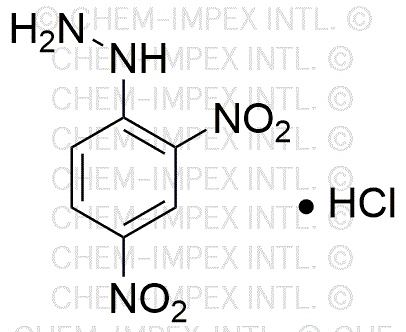2,4-Dinitrophenylhydrazine hydrochloride is widely utilized in research focused on:
- Analytical Chemistry: This compound is commonly used for the qualitative and quantitative analysis of carbonyl compounds in various samples, such as food and biological materials, allowing researchers to assess the presence of aldehydes and ketones.
- Organic Synthesis: It serves as a key reagent in the synthesis of hydrazones, which are important intermediates in the production of pharmaceuticals and agrochemicals, enhancing the efficiency of chemical reactions.
- Environmental Testing: The compound is employed in the detection of carbonyl pollutants in air and water samples, providing valuable data for environmental monitoring and regulatory compliance.
- Biochemistry: It is used in the identification of reducing sugars and amino acids through colorimetric assays, facilitating research in metabolic studies and nutritional analysis.
- Forensic Science: The reagent is utilized in the identification of specific compounds in forensic samples, aiding in criminal investigations and toxicology reports.
General Information
Properties
Safety and Regulations
Applications
2,4-Dinitrophenylhydrazine hydrochloride is widely utilized in research focused on:
- Analytical Chemistry: This compound is commonly used for the qualitative and quantitative analysis of carbonyl compounds in various samples, such as food and biological materials, allowing researchers to assess the presence of aldehydes and ketones.
- Organic Synthesis: It serves as a key reagent in the synthesis of hydrazones, which are important intermediates in the production of pharmaceuticals and agrochemicals, enhancing the efficiency of chemical reactions.
- Environmental Testing: The compound is employed in the detection of carbonyl pollutants in air and water samples, providing valuable data for environmental monitoring and regulatory compliance.
- Biochemistry: It is used in the identification of reducing sugars and amino acids through colorimetric assays, facilitating research in metabolic studies and nutritional analysis.
- Forensic Science: The reagent is utilized in the identification of specific compounds in forensic samples, aiding in criminal investigations and toxicology reports.
Documents
Safety Data Sheets (SDS)
The SDS provides comprehensive safety information on handling, storage, and disposal of the product.
Product Specification (PS)
The PS provides a comprehensive breakdown of the product’s properties, including chemical composition, physical state, purity, and storage requirements. It also details acceptable quality ranges and the product's intended applications.
Certificates of Analysis (COA)
Search for Certificates of Analysis (COA) by entering the products Lot Number. Lot and Batch Numbers can be found on a product’s label following the words ‘Lot’ or ‘Batch’.
Numéro de catalogue
Numéro de lot/série
Certificates Of Origin (COO)
This COO confirms the country where the product was manufactured, and also details the materials and components used in it and whether it is derived from natural, synthetic, or other specific sources. This certificate may be required for customs, trade, and regulatory compliance.
Numéro de catalogue
Numéro de lot/série
Safety Data Sheets (SDS)
The SDS provides comprehensive safety information on handling, storage, and disposal of the product.
DownloadProduct Specification (PS)
The PS provides a comprehensive breakdown of the product’s properties, including chemical composition, physical state, purity, and storage requirements. It also details acceptable quality ranges and the product's intended applications.
DownloadCertificates of Analysis (COA)
Search for Certificates of Analysis (COA) by entering the products Lot Number. Lot and Batch Numbers can be found on a product’s label following the words ‘Lot’ or ‘Batch’.
Numéro de catalogue
Numéro de lot/série
Certificates Of Origin (COO)
This COO confirms the country where the product was manufactured, and also details the materials and components used in it and whether it is derived from natural, synthetic, or other specific sources. This certificate may be required for customs, trade, and regulatory compliance.


